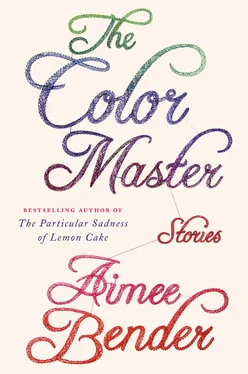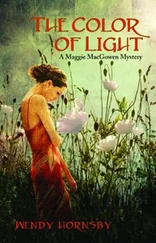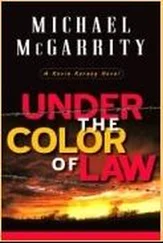On light feet, the woman crept closer. She ran through the grasses and leapt into another tree. The humans were muttering amongst themselves because although they had seen bodies eaten it was something else to see a body reemerge. The man’s parts were now moldering in the grass, perhaps for the same bear cub. When she was close enough, at a high perch, she found she could recognize the man. An uncle of hers, a distant uncle, her mother’s eldest brother. His twisted hand, his nose, that tweaked shoulder and distinctive jaw. She clung to the branch and thought perhaps her husband had thrown up the man because the taste had reminded him of his own children. Perhaps he had banged up against memory through an inexplicable familiarity. He had never told her he was sad. He had never expressed true regret. They had, in fact, never really talked about it. How to talk about it? How could she blame him, or could he blame her? Weren’t they both to blame for it, and also blameless? Who were the little human children who’d escaped, and where were they now?
The remaining ogres staggered off, and the remaining humans went to surround her dead uncle’s parts. It was a truce moment. There had been enough death, and the ogres were not going to be vanquished, and the remaining humans did not want to be eaten, so they put the uncle’s body into burlap bags and began the slow march home. Her ogre sank to the grasses on his knees and hung his head. He stayed there for hours, wilted, hunched, and from her perch in the tree, she sent him love. She made her love into a piece of the wind, formed from the air in her and placed on the air outside her, and sent it to him, even though it would be too diffuse by the time it got there. Still, even the bear cub felt it, trotting over to whatever remaining organ bits he could find, lifting up his nose to smell the new hint of freshness in the evening air.
The cake, at first, had remained in the tree. Lodged in the branch nook of the old oak where she’d left it. But various birds found it in a few short days—they could smell its bready sweetness from yards away—and they pecked so hard at the napkin that the cake fell from the nook and rolled out of the linen. On the ground, the birds pecked it into nothing. It replenished. They pecked. It replenished. The cake wanted to satisfy the birds, so it made itself into a seeded type, and the birds went at it with new vigor. The cake replenished. The birds were so full they hopped off, wobbling, but they returned with eagerness in the morning, and the next morning, and the birds that lived near the oak tree became fat and listless. They could hardly fly. All they did all day long was peck at the cake.
The cake had grown old. It had been made so many years ago, and it had been so many cakes in its time.
I will never die, thought the cake to itself, in even simpler terms, as cakes did not have sophisticated use of language.
On her walk back, the woman saw it on the ground. She recognized her napkin, checked blue against the dirt. She was heading home. She was not sure if she could really return, or how to do it, but she wanted to try. She missed her husband, and the sight of him throwing up her uncle had filled her with a sore and tender love. There was the cake, in seeded form now, and she felt sorry for it.
With her pointed stick, she dug a hole in the ground. Now, dear cake, she said, gently burying it, patting the dirt. At least you can rest. At least you will not be endlessly pecked and diminished.
The birds found it in a day. A cake like that? Let that kind of thing go? They thought not. They scrabbled in the dirt and dragged it out with their beaks. They had missed it, for that missing day. They pecked with unusual ardor. A few worms had already attached to its bottom side and were eating it too, and the cake had formed its back side into a kind of dirt cake and its front into seed, and it would replenish itself according to the ratio of its eaters.
It went on like this for a while, and a few of the birds died early, from overeating and lack of flight. New birds came and went. Same with the worms.
The woman returned to her house, and her husband opened the door, widening it when he saw it was her, and they sat at the kitchen table. It did not feel wrong. She got up and took her items out of her dirty bag and piled them into the sink for laundry. That moment a few days later when their arms touched over by the guest room? They ate their stew bowls together. They walked formally into the living room, sat on a sofa, and stumbled through a conversation. At night, she climbed onto his chest to sleep and he held her in place like a belt. Later, they took a few trips to a waterfall, and a glacier, and befriended an ogre who ran a school. After many years, the woman died of natural causes, and a few years after that, the ogre died. Eventually, his mistresses died. Down on the ground, in the people village, over decades, the war men and women died. The human girl who had escaped her early death died, across the land, over by the ocean, in her shack of blue bowls and rocking chairs. The witch who had originally made the cake and made up the spell and given it as a gift to her beloved ogre-friend died.
The cake went on and on.
Time passed, and the climate shifted. The trees and grasses faded, and the land grew dry. Birds stopped flying overhead. Reptiles ate the cake but eventually died out. The worms dried into dust. A quarter mile away, the magic cloak had stayed stuffed in its tree, hidden from view over many, many years. Some wind had nudged it into open air, and now, half-tucked in the broken branches of a dead tree trunk, was a shining bright coat-shaped area of dappled light through foliage. It showed dapple long after the sun had stopped shining through any leaves, because there were no more leaves.
Neither could move, but the cake felt a sense of the presence of the cloak, and thought it might be a new eater coming to find the cake, and the cake, always wanting to please—the cake who had found a way to survive its endlessness by recreating its role over and over again—tried to figure out in its cake way what this light-dappled object might want to eat. So it became darkness. A cake of darkness. It did not have to be human food. It did not have to be digestible through a familiar tract. It lay there on the dirt, waiting, a shimmering cake of darkness. Through time, and wind, and earthquakes, and chance, at last the cloak fell out of the tree and blew across the land and happened upon the cake, where it ate its darkness and extinguished its own dappled light. The cloak disappeared into night and was not seen again, as it was only a piece of coat-shaped darkness now and could no longer be spotted so easily, had there been any eyes left to see it. It floated and joined with nowhere. Darkness was overtaking everything anyway. Pouring over the land and sky. The cake itself, still in the shape of darkness, sat on the hillside.
What’s left? said the cake. It thought in blocks of feeling. It felt the thick darkness all around it. What is left to eat me? To take me in?
Darkness did not want to eat more darkness, not especially. Darkness did not care for carrot cake, or apple pie. Darkness did not seem interested in a water cake, or a cake of money. Only when the cake filled with light did it come over. The darkness, circling around the light, devouring the light. But the cake kept refilling, as we know. This is the spell of the cake. And the darkness, eating light, and again light, and again light, lifted.
Big thanks to the core of usual suspects, including Bill Thomas and Henry Dunow, Coralie Hunter and Yishai Seidman and Mark Miller, plus additional indebtedness for new help and advisement from Sarah Bynum, Mark Danielewski, Susan Laemmle, and Amy Cutler for her wonderfully evocative painting Tiger Mending .
Читать дальше












